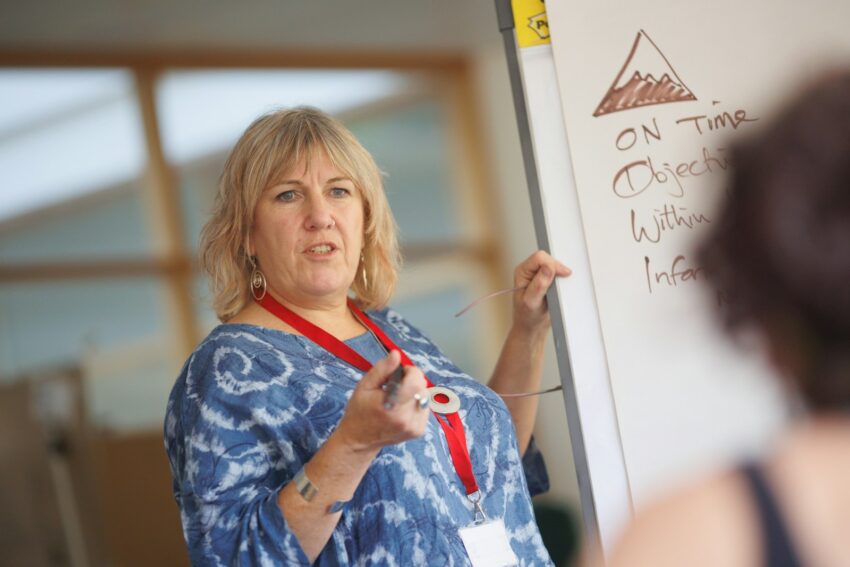Most people probably think of a speech-language pathologist as someone who works in a hospital.
However, SLPs have many more options for practicing in environments beyond what initially comes to mind. As the role and scope of the profession have evolved, new practice areas have emerged. These areas allow pathologists to make an impact in diverse communities in need.
This article explores how and where speech therapists are applying their expertise outside of traditional hospital environments.

Who Is a Speech-Language Pathologist?
SLPs are specialists in the diagnosis and treatment of swallowing and communication difficulties.
The field is experiencing rapid growth, with a projected 19% increase in employment from 2022 to 2032, significantly outpacing the average for other occupations. As per BLS, an estimated 13,200 job openings are expected annually during this period, largely due to workforce turnover and retirements.
SLPs work with diverse age groups, from infants to seniors, addressing a wide range of communication and swallowing issues:
- Speech sound production: Helping with articulation, phonological disorders, apraxia of speech, and dysarthria.
- Language comprehension and expression: Assisting those with difficulties understanding or using language, including aphasia in adults.
- Literacy skills: Supporting reading, writing, and spelling development.
- Social communication: Improving pragmatic skills such as turn-taking and appropriate social interactions.
- Voice disorders: Treating issues related to vocal quality, volume, and resonance.
- Fluency: Addressing stuttering and other speech flow problems.
- Cognitive-communication: Enhancing memory, attention, problem-solving, and organizational skills.
- Feeding and swallowing: Managing dysphagia and related nutritional concerns.
According to Ithaca College, SLPs are essential in improving people’s communication skills and general quality of life. They are qualified experts who can work in a variety of environments, such as private offices, healthcare facilities, and educational institutions. We will explore this further in the next section.
Many SLPs hold advanced degrees, including online SLP graduate programs, which may be offered in hybrid or fully online formats.
From Schools to Hospitals: The Wide-Ranging Work Environments of SLPs
Speech-language pathologists work in diverse environments, with educational settings being the most common. As per ASHA, over half of SLPs (56%) are employed in education, primarily in schools (53%) and higher education institutions (3%).
In early intervention, preschool, and K-12 settings, SLPs perform a wide range of duties. These responsibilities include conducting evaluations, working with children who have various disabilities, and providing individual and group services. Additionally, they collaborate with educators and parents, participate in program planning, develop educational plans, and supervise support staff.
The healthcare sector employs 39% of SLPs, distributed across nonresidential facilities (16%), hospitals (13%), and residential care settings (10%). In hospitals, SLPs diagnose and treat various disorders, work in multidisciplinary teams, counsel patients and families, and educate other healthcare professionals. Residential care facilities involve similar work, often with a focus on longer-term functional skill development.
Nonresidential healthcare settings, such as clinics, doctor’s offices, and home health services, allow SLPs to treat diverse age groups. They also enable SLPs to specialize in specific disorders or populations.
ASHA also mentions that private practice employs about 19% of SLPs, offering entrepreneurial opportunities and flexibility in caseload and schedule management. Some practitioners work independently, while others manage larger practices with diverse staff.
Corporate speech-language pathology is an emerging field where SLPs consult for businesses, offering services like communication skills training and accent modification.
Government agencies, including public health departments and uniformed services, also employ SLPs in various capacities. These roles may involve providing direct services, consultations, or conducting research for active military, veterans, and underserved populations.
How Much Do SLPs Earn?
SLPs earn competitive salaries in the healthcare field. According to U.S. News, the median annual income for SLPs in 2022 was $84,140. There’s significant variation in earnings, with the top quartile of professionals making over $104,500 annually while the bottom quartile earned less than $66,700.
Location plays a crucial role in determining an SLP’s salary. Several metropolitan areas stand out for offering particularly high compensation. For instance, SLPs working in certain California cities like San Francisco, Napa, San Jose, and Modesto can expect salaries well above the national average. In these locations, salaries often exceed $115,000 per year.
Outside of California, Urban Honolulu in Hawaii also ranks among the top-paying locations for this profession.
These figures highlight the potential for lucrative careers in speech-language pathology, especially for those willing to work in high-demand urban areas. It’s crucial to remember that living expenses could also be higher in these areas, which could affect the actual worth of these earnings.
FAQs
1. What is the rate of job satisfaction in speech pathology?
A: Speech pathologists generally report moderate to high job satisfaction. When surveyed about their work environment, most speech-language professionals express contentment, with an average rating of 3.3 out of 5. This suggests that while the job has its challenges, many find it fulfilling and not overly stressful.
2. What are some of the challenges of becoming a speech pathologist?
A: Entering the field of speech pathology requires significant dedication and investment in education. Aspiring professionals must typically complete a master’s degree program in speech-language pathology. Additionally, they need to fulfill licensing requirements, which can be both financially and time-intensive. For some people, such factors may make the road to becoming a speech pathologist challenging.
3. What are the rewards of a career in speech pathology?
A: Many speech pathologists find their work deeply rewarding. The profession offers the opportunity to make a meaningful difference in people’s lives, working closely with patients and their families. Speech pathologists often derive satisfaction from guiding clients through their therapeutic journey and celebrating their achievements.
As the field grows rapidly due to aging demographics and medical advancements, speech therapy offers a promising career path. It attracts those interested in directly impacting lives by addressing speech, language, and swallowing needs. Hospital work remains important, but there are many other practice environments available. These options show how SLPs can make a difference in all communities that need their crucial services.


